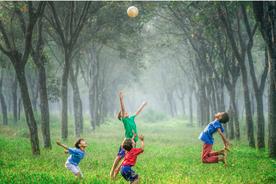六一儿童节英文怎么说(那些与儿童有关的词)
今天是“六一”儿童节(Children's Day),是全世界孩子们的节日。我们会来了解一下一些有关孩子们的词汇吧!

“小皇帝”
中国80后的独生子女一度都被人称为家里的“小皇帝”。在家里,他们的地位最高,父母、祖父母都得围着转。其实国外也有这样的现象,他们被称为kindergarchy。
Kindergarchy, refers to rule or domination by children, or the belief that children's needs and preferences take precedence over those of their parents or other adults.
“小皇帝”指由孩子统治,或者认为孩子的需求和喜好优先于家长和其他大人需求的观点,即“孩子为王”。
在这个危险的新世界里,无论孩子们做什么,他们永远是可爱的,是需要鼓励的。在这里,孩子们的需求高于一切。
挂钥匙儿童
现在有一种普遍的现是孩子们脖子上挂串钥匙,放学回家自己开门,自己一个人在家待着写作业或看电视,饿了也只能忍着,等爸妈回来才能吃上饭。
Latchkey kid or latchkey child refers to a child who returns from school to an empty home because his or her parent or parents are away at work, or a child who is often left at home with little or no parental supervision.
“挂钥匙儿童”指因为父母出去工作,所以放学后独自在家、无人照看的孩子。
据说,“挂钥匙儿童”这个说法来自于NBC(美国全国广播公司)1944年的一部纪录片。这部纪录片讲的是二战以后,夫妻中的一方必须参军,而另一方就得出去工作养家,因此,把孩子独自留在家里的情况越来越普遍。
“以后再说”儿童
父母忙碌的工作安排正创造出一代“以后再说”儿童,而父母总是没有时间跟他们待在一起。
Maybe Later' children comes from the response dished out when Mummy or Daddy are asked to play a game or read a story or simply run around the garden.
'Maybe Later' children(“以后再说”儿童)这个说法来源于那些忙碌的父母,当孩子要求爸爸或妈妈陪他们一起玩游戏或给他们读个故事,或者仅仅是跟他们一起围着花园跑一圈时,爸爸妈妈们最常给出的就是这个回答“Maybe Later”(以后再说)。
研究人员发现,虽然在父母的生活中,孩子们占据最重要的位置,但有80%的父母承认自己在孩子们身上花的时间太少。
别人家的孩子
"望子成龙,望女成凤”似乎是很多家长的想法,自己年轻时没有实现的理想要让自己的下一代来实现。于是,模范、标兵、优秀…各种各样能在父母脸上贴金的荣誉诞生了。小朋友们则被包装成了trophy child。
Trophy childrefers to a child used to impress other people and enhance the status of the parents. The child has to fit into the perfect picture of what the family is supposed to look like. They have to be in the best schools; they always have to look good. Their parents are so narcissistic, they can't see their child as an individual, only a reflection of themselves.
“模范儿童”指父母用来在别人面前夸耀,提升父母在人前地位的好孩子。这些孩子必须在家庭期望中表现得完美无缺。他们要上最好的学校,必须每时每刻都保持良好的形象。这些孩子的父母多半都很自恋,他们并没有把孩子当成单独的个体,而只是看作了他们自身的翻版。
忙碌儿童
周末的早晨,本该是学生和上班族们在家补觉的时间,可是在公交车上总是能看到一对对母女、祖孙、父子或母子们背着书包,拎着琴盒、画板之类的物件奔向某个“班”的上课地点。
Hurried child syndromerefers to a condition in which parents overschedule their children's lives, push them hard for academic success, and expect them to behave and react as miniature adults.
Hurried child syndrome(忙碌儿童综合症/揠苗助长综合症)指的是家长将孩子的生活安排得过满、极力要求孩子在学业上取得佳绩,并且希望孩子像小大人一样行为和做事的现象。
忙碌儿童综合症的症状之一就是强迫学龄前儿童不断参加各种班和特长培训,以帮助他们为入学做好准备。这种现象也被称为“温室培育”(hothousing )和“超级宝贝综合症”(the superbaby syndrome )。
“忙碌儿童”这个概念是由心理学家大卫•艾尔金德在其1981年出版的著作《忙碌儿童:成长得太快》首次提出的。
自由放养儿童
最近几年,教育部门一直都在说要为学生们减负,不让学校在节假日补课,不让留太多的作业,也不让过度重视考试。欧美一些国家也鼓励“放养式”的教育。
The expression “free range” usually relates to animals - often chickens and cows that range or go looking freely for food, rather than being closed in a cage or yard.
“Free range(自由放养)”这个短语通常与动物有关,指鸡或牛被放散出去自己觅食,而不是被关在笼子或牛圈里喂养。
The idea behind this is that animals allowed to wander about and be free will be happier and healthier and thus be better for human consumption.
这种喂养方式传达的理念是,自由放养的动物一般会更快活,也更健康,这样也就更适宜人类食用。
So the idea of a free-range kidis that the child was allowed a fair amount of freedom by their parents while growing up. It’s said that this group of kids are more likely to thrive than those who are strictly monitored by parents. Allowing one's children free time is called free-range parenting.
因此,“自由放养儿童”也就是在成长过程中能够从家长那里得到更多自由的孩子。据说这样成长起来的孩子比那些时刻受家长严密监控的孩子更容易成功。那些给孩子更多自由时间的家长就可以被称为“自由放养父母”了。
宝妈男和宝爸女的心理更健康
They may be the stereotypical butt of jokes. But mummy's boysare less likely to suffer from poor mental health or unpopularity at school, research suggests.
这听上去像是老套的笑话,但研究显示,妈宝男不太容易出现心理健康问题,而且在学校人缘也不错。
And the same is true for daddy's girls, who enjoy a similar lift in their self-esteem and confidence.
爸宝女也是如此。她们的自尊和自信程度也都较高。
美国婚姻基金会开展的这项研究得出结论称,与妈妈关系亲密的男孩和与爸爸关系亲密的女孩更适应青春期(teenage life)。
